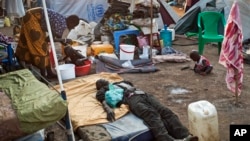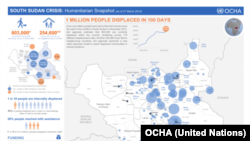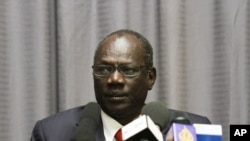WASHINGTON —
A top USAID official has called on leaders on both sides of South Sudan's conflict to ensure that aid reaches the millions of people in desperate need in the country, amid reports that supplies are being blocked or even confiscated by government and rebel troops.
"The people of South Sudan cannot afford for aid be delayed," USAID Assistant Administrator Nancy Lindborg said in an interview with South Sudan in Focus.
"The rivers have been closed to humanitarian deliveries... all these instances of humanitarian aid workers being harassed, of being stopped at checkpoints, being forced to pay huge bribes -- these are actions that the government and the opposition leadership need to take a very strong stance on and make very clear that, for the people's sake, humanitarian assistance needs to reach them," she said.
Nearly four months of conflict in South Sudan have forced the United States to shift its focus from providing development funds to build the world's newest nation, to providing aid that saves lives, she said.
"Right now we're very much focussed on... providing food, health, urgent livelihoods -- the kind of assistance that helps people stay alive," Lindborg said.
More than a million people have been forced from their homes by the conflict that broke out in South Sudan in mid-December. U.N. agencies have warned that more than a third of the population of 10.8 million is in danger of food insecurity as the fighting stretches on into a fourth month. Lindborg said that the huge development gains seen by South Sudan in the two-and-a-half years since independence in July 2011 have been largely wiped out by just over 100 days of conflict. She faulted the leadership of South Sudan for allowing its own internal rows to boil over into conflict that has diverted the country from the path of development.
"We have applauded, we have supported the vision of the people of South Sudan for a peaceful, united, democratic country," Lindborg said. "It is tragic that their leadership has not been able to keep the country on this pathway."
But the United States has not given up hope that one day soon it will again be able to provide development assistance to South Sudan instead of sending emergency aid.
"Our hope and our goal is to be able to move from this focus on humanitarian back into development, but for us to do that we need to have the fighting stop and there needs to be peace again," Lindborg said.
"The United States is very much committed to continue supporting the people of South Sudan and we deeply hope there will be a peaceful pathway that re-emerges very soon, for the sake of so many people who fought so long and hard, many of whom are on the brink of massive food insecurity," she said.
Speaking with South Sudan in Focus on the day that slow-moving peace talks for South Sudan were adjourned again. Lindberg also urged South Sudanese officials to work with the media in South Sudan instead of placing numerous constraints on journalists reporting on the ongoing conflict.
South Sudan's Information Minister, Michael Makuei, said last month that reporters who broadcast or publish interviews inside South Sudan with anti-government representatives are violating the law. Several journalists have been detained and questioned during the fighting and some have been expelled from the country.
The government has denied that it questions reporters, insisting it merely offers them advice.
Lindborg said muzzling the media was the wrong tactic, and the government should instead build its relationship with journalists so that they give the people of South Sudan the full picture of what's going on in the country.
"When people have information about what's going on, they are better able to call for a peaceful, united future," she said.
"I think a lot of people in South Sudan now want peace... It's important for the media to put that message out there so people understand that this not a war against your neighbor... This is regrettably a conflict between leaders who need to come together, stop the fighting and get back on the pathway to peace," she said.
The interview with Nancy Lindborg was conducted by John Tanza.
"The people of South Sudan cannot afford for aid be delayed," USAID Assistant Administrator Nancy Lindborg said in an interview with South Sudan in Focus.
"The rivers have been closed to humanitarian deliveries... all these instances of humanitarian aid workers being harassed, of being stopped at checkpoints, being forced to pay huge bribes -- these are actions that the government and the opposition leadership need to take a very strong stance on and make very clear that, for the people's sake, humanitarian assistance needs to reach them," she said.
Nearly four months of conflict in South Sudan have forced the United States to shift its focus from providing development funds to build the world's newest nation, to providing aid that saves lives, she said.
"Right now we're very much focussed on... providing food, health, urgent livelihoods -- the kind of assistance that helps people stay alive," Lindborg said.
More than a million people have been forced from their homes by the conflict that broke out in South Sudan in mid-December. U.N. agencies have warned that more than a third of the population of 10.8 million is in danger of food insecurity as the fighting stretches on into a fourth month. Lindborg said that the huge development gains seen by South Sudan in the two-and-a-half years since independence in July 2011 have been largely wiped out by just over 100 days of conflict. She faulted the leadership of South Sudan for allowing its own internal rows to boil over into conflict that has diverted the country from the path of development.
"We have applauded, we have supported the vision of the people of South Sudan for a peaceful, united, democratic country," Lindborg said. "It is tragic that their leadership has not been able to keep the country on this pathway."
But the United States has not given up hope that one day soon it will again be able to provide development assistance to South Sudan instead of sending emergency aid.
"Our hope and our goal is to be able to move from this focus on humanitarian back into development, but for us to do that we need to have the fighting stop and there needs to be peace again," Lindborg said.
This is regrettably a conflict between leaders who need to come together, stop the fighting and get back on the pathway to peace.Nancy Lindborg, USAID
Speaking with South Sudan in Focus on the day that slow-moving peace talks for South Sudan were adjourned again. Lindberg also urged South Sudanese officials to work with the media in South Sudan instead of placing numerous constraints on journalists reporting on the ongoing conflict.
South Sudan's Information Minister, Michael Makuei, said last month that reporters who broadcast or publish interviews inside South Sudan with anti-government representatives are violating the law. Several journalists have been detained and questioned during the fighting and some have been expelled from the country.
When people have information about what's going on, they are better able to call for a peaceful, united future.Nancy Lindborg, USAID
Lindborg said muzzling the media was the wrong tactic, and the government should instead build its relationship with journalists so that they give the people of South Sudan the full picture of what's going on in the country.
"When people have information about what's going on, they are better able to call for a peaceful, united future," she said.
"I think a lot of people in South Sudan now want peace... It's important for the media to put that message out there so people understand that this not a war against your neighbor... This is regrettably a conflict between leaders who need to come together, stop the fighting and get back on the pathway to peace," she said.
The interview with Nancy Lindborg was conducted by John Tanza.










